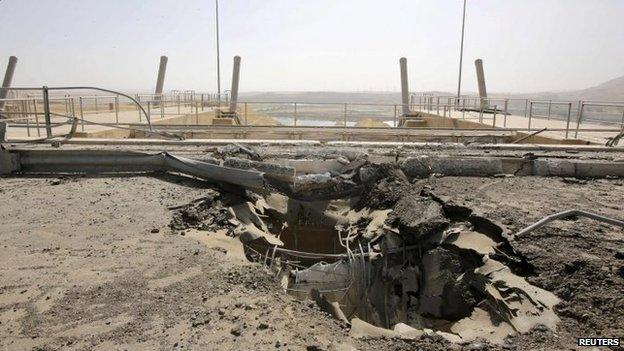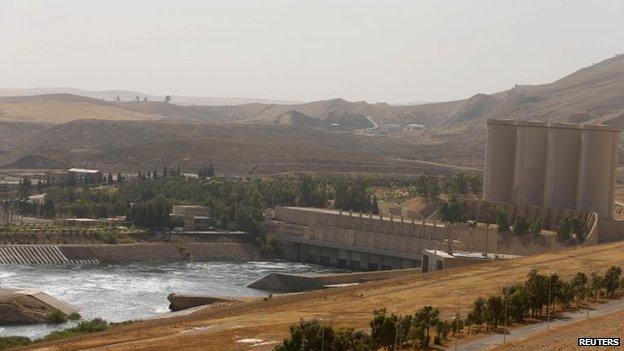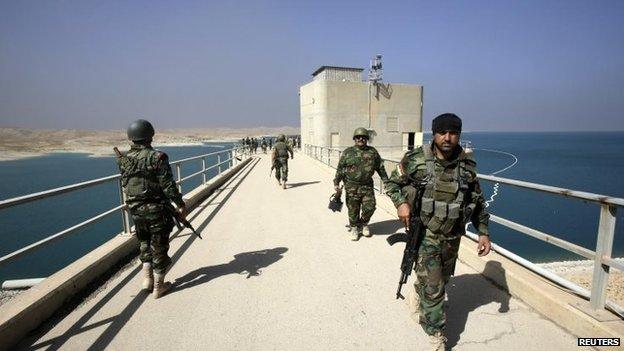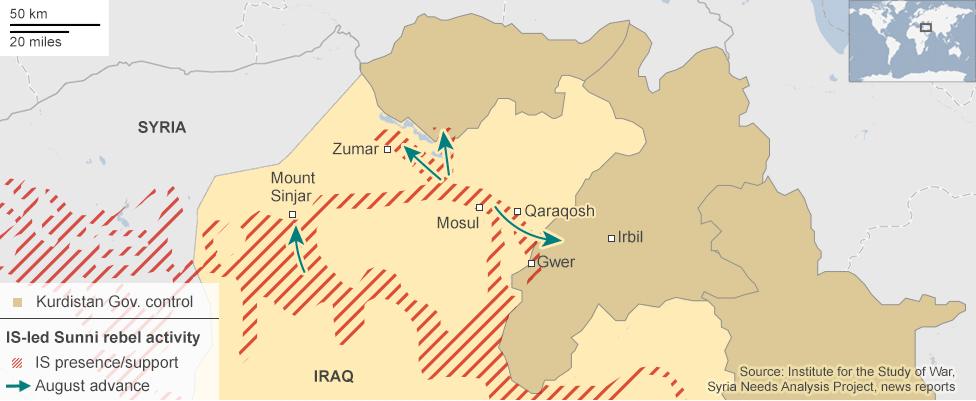James Foley killers 'wanted $132m ransom'
- Published
The BBC's Ian Pannell says finding Mr Foley's killer and bringing him to justice may be impossible
Jihadists holding US journalist James Foley wanted a $132m (£80m) ransom for his release, his employer has said.
GlobalPost CEO Philip Balboni said the Islamic State (IS) militants had first demanded money last year.
Mr Foley was abducted in November 2012, and a video of his beheading was released by IS earlier this week.
The US has begun a formal criminal investigation into Mr Foley's death, with the attorney general warning that the country has a "long memory".
Meanwhile, speaking at a press conference on Thursday, US Defence Secretary Chuck Hagel described IS as an imminent threat and "beyond just a terrorist group".
"They marry ideology, a sophistication of strategic and tactical military prowess, they are tremendously well-funded... this is beyond anything that we have seen," he said.
Hunt for killer
In the UK, police and security services are trying to identify the jihadist who appeared in footage of Mr Foley's killing.
Unconfirmed reports suggest the man - who had an English accent - is from London or south-east England.
US Defence Secretary Chuck Hagel: "Isil clearly poses a long-term threat''
In the video of Mr Foley's murder, IS militants threatened to kill another American if the US did not stop its air strikes against the group in northern Iraq.
US air strikes have continued near Mosul despite the warning.
'Vigilant and relentless'
On Thursday, US Attorney General Eric Holder said the US pursuit of Mr Foley's killer would be determined.
"Those who would perpetrate such acts need to understand something: this justice department, the Department of Defence, this nation, we have long memories and our reach is very wide," he said.
On Wednesday, President Barack Obama vowed to bring the perpetrators to justice.
"We will be vigilant and we will be relentless," he said. "When people harm Americans, anywhere, we do what's necessary to see that justice is done."

The US has carried out air strikes in Iraq since 8 August
Air strikes intensify
The US has been conducting air strikes across Iraq since 8 August, as part of a campaign against IS targets.
US aircraft destroyed or damaged four IS vehicles and several bomb placements in strikes near Mosul dam on Thursday, the military said.
There have been a total of 90 air strikes across Iraq since operations began, the Pentagon said.
Of those 90 strikes, 57 have been near Mosul Dam.
Jeremy Cooke reports from the front line, as Iraq forces battle Islamic State militants
The dam, which controls the water and power supplies to large areas of Iraq, has become a key battleground.
The US said Iraqi troops and Kurdish peshmerga fighters recaptured the dam with American assistance on Monday.
IS fighters have waged a violent campaign in Iraq and Syria, seizing large swathes of both countries.
The violence has displaced an estimated 1.2 million people in Iraq alone.

US aircraft have targeted the area around the strategically important Mosul Dam

How many foreign fighters are in IS?
There are estimated to be about 3,000 citizens from Western countries currently fighting for IS in Iraq and Syria, the London-based Royal United Service Institute (Rusi) says.
According to Rusi, the majority are believed to be from the UK, Belgium, the Netherlands, Germany, France and the Nordic nations.
The UK government says up to 400 British nationals are fighting alongside militant groups.
But these jihadists are said to be far outnumbered by volunteers from Arab nations such as Tunisia, Morocco and Saudi Arabia.
A June 2014 report from the New York-based consultancy the Soufan Group suggested people from at least 81 different countries had become involved, including citizens from Australia, the US, Canada, Ireland, and Spain.
Sources: Rusi, Soufan Group, BBC Analysis and Research

'No intelligence failure'
The US defence department has revealed that the US "attempted a rescue operation recently to free a number of American hostages held in Syria".
"Unfortunately, the mission was not successful because the hostages were not present at the targeted location."
It was the first time the US government had acknowledged that its forces had operated in Syria since the country's civil war began in 2011.
Mr Hagel said that Mr Foley was among those they had attempted to rescue in the operation.

US forces in the air are helping Kurdish forces on the ground
He told reporters that despite the mission being unsuccessful, it was not a "failure of intelligence".
US Army General Martin Dempsey said: "The mission was executed flawlessly, after a significant period of preparation and planning... and it turned out the hostages were no longer at that location."

Formed out of al-Qaeda in Iraq (AQI) in 2013, IS first captured Raqqa in eastern Syria
By early 2014 it controlled Falluja in western Iraq
Has since captured broad swathes of Iraq, seizing the northern city of Mosul in June
Fighting has displaced at least 1.2 million Iraqis
Pursuing an extreme form of Sunni Islam, IS has persecuted non-Muslims such as Yazidis and Christians, as well as Shia Muslims, whom it regards as heretics
In July alone, IS expanded dramatically, recruiting some 6,300 new fighters largely in Raqqa, an activist monitoring group said.

Islamic State activities as of 14 August
